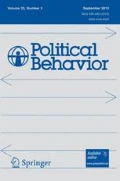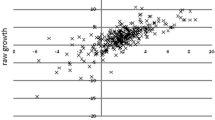Abstract
The time horizon of economic voting is unsettled. Each aggregate time series study offers a different specification, virtually all retrospective. The survey research, which does look at individuals, mostly assumes that economic voters are myopic and retrospective. Unfortunately, the available data have permitted the testing of few rival hypotheses. However, new data from the Surveys of Consumer Attitudes allow further exploration. These rich surveys show that, at least in the 1984 elections, the American voter did respond to immediate past economic conditions. And more noteworthy, they responded strongly to future economic expectations, whether personal or collective, short-term or long-term. These sharp prospective results call into question standard explanations of economic voting, which have relied on some variant of retrospective theory.
Similar content being viewed by others
References
Abramson, Paul, Aldrich, John H., and Rohde, David (1982).Change and Continuity in the 1980 Elections. Washington, DC: CQ Press.
Chappell, Henry W., Jr., and Keech, William R. (1985). A new view of political accountability for economic performance.American Political Science Review 79:10–27.
Conover, Pamela Johnston, and Feldman, Stanley (1983). Emotional reactions to the economy: I'm mad as hell and I'm not going to take it anymore. Paper presented at the 1983 Annual Meeting of the American Political Science Association.
Downs, Anthony (1957).An Economic Theory of Democracy. New York: Harper.
Eulau, Heinz, and Lewis-Beck, Michael S. (eds.) (1985).Economic Conditions and Electoral Outcomes: The United States and Western Europe. New York: Agathon.
Feldman, Stanley (1982). Economic self-interest and political behavior.American Journal of Political Science 26:446–466.
Feldman, Stanley (1984). “Economic self-interest and the vote: Evidence and meaning.Political Behavior 6:229–252.
Fiorina, Morris P. (1978). Economic retrospective voting in American elections.American Journal of Political Science 22:426–443.
Fiorina, Morris P. (1981).Retrospective Voting in American National Elections, New Haven: Yale University Press.
Frankovic, Kathleen A. (1985). The 1984 election: The irrevelance of the campaign.PS 18:39–47.
Key, V. O., Jr. (1966).The Responsible Electorate. New York: Vintage.
Kiewiet, D. Roderick (1983).Macroeconomics and Micropolitics. Chicago: University of Chicago Press.
Kiewiet, D. Roderick, and Rivers, Douglas (1985b). A retrospective on retrospective voting. In Heinz Eulau and Michael S. Lewis-Beck (eds.),Economic Conditions and Electoral Outcomes: The United States and Western Europe, pp. 207–231. New York: Agathon.
Kiewiet, D. Roderick, and Rivers, Douglas (1985a). The economic basis of Reagan's appeal. In John Chubb and Paul Peterson (eds.),The New Direction in American Politics. Washington, D.C.: The Brookings Institution.
Kinder, Donald R., and Kiewiet, D. Roderick (1979). Economic discontent and political behavior: The role of personal grievances and collective economic judgments in congressional voting.American Journal of Political Science 23:495–527.
Kinder, Donald R., and Kiewiet, D. Roderick (1981). Sociotropic politics: The American Case.British Journal of Political Science 11:129–162.
Kinder, Donald R., and Mebane, Walter R., Jr. (1983). Politics and economics in everyday life. In Kristen Monroe (ed.),The Political Process and Economic Change. New York: Agathon.
Kramer, Gerald H. (1983). The ecology fallacy revisited: Aggregate- versus individual-level findings on economics and elections, and sociotropic voting.American Political Science Review 77:92–111.
Kuklinski, James H., and West, Darrell M. (1981). Economic expectations and voting behavior in United States Senate and House elections.American Political Science Review 75:436–447.
Lewis-Beck, Michael S. (1986). Comparative economic voting: Britain, France, German, Italy.American Journal of Political Science 30:315–346.
Lewis-Beck, Michael S., and Mohr, Lawrence B. (1976). Evaluating effects of independent variables.Political Methodology 3:27–47.
Lipset, Seymour Martin (1985). The elections, the economy and public opinion: 1984.PS 18:28–38.
Magruder, Frank Abbott (1942).American Government. Boston: Allyn & Bacon.
Miller, Arthur H., and Wattenberg, Martin P. (1985). Throwing the reseals out: Policy and performance evaluations of presidential candidates, 1952–1980.American Political Science Review 79:359–372.
Norpoth, Helmut (1984). Economics, politics, and the cycle of presidential popularity.Political Behavior 6:253–273.
Norpoth, Helmut (1985). The economy and presidential popularity in the United States. Paper presented at the XIIIth World Congress of the International Political Science Association, Paris, July 15–20, 1985.
Peffley, Mark (1984). The voter as juror: Attributing responsibility for economic conditions.Political Behavior 6:275–294.
Rosenstone, S. J., Jr., Hansen, J. M., and Kinder, D. R. (1983). Measuring personal economic well-being. Report submitted to the Board of Overseers, National Election Study, and the 1984 National Election Study Planning Committee.
Schneider, Friedrich (1984). Public attitudes toward economic conditions and their impact on government behavior.Political Behavior 6:211–228.
Author information
Authors and Affiliations
Rights and permissions
About this article
Cite this article
Lewis-Beck, M.S. Economics and the American voter: Past, present, future. Polit Behav 10, 5–21 (1988). https://doi.org/10.1007/BF00989377
Issue Date:
DOI: https://doi.org/10.1007/BF00989377




